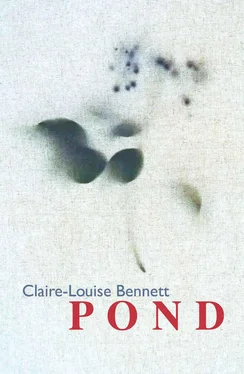Claire-Louise Bennett - Pond - Stories
Здесь есть возможность читать онлайн «Claire-Louise Bennett - Pond - Stories» весь текст электронной книги совершенно бесплатно (целиком полную версию без сокращений). В некоторых случаях можно слушать аудио, скачать через торрент в формате fb2 и присутствует краткое содержание. Год выпуска: 2015, Издательство: Stinging Fly Press, Жанр: Современная проза, на английском языке. Описание произведения, (предисловие) а так же отзывы посетителей доступны на портале библиотеки ЛибКат.
- Название:Pond: Stories
- Автор:
- Издательство:Stinging Fly Press
- Жанр:
- Год:2015
- ISBN:нет данных
- Рейтинг книги:3 / 5. Голосов: 1
-
Избранное:Добавить в избранное
- Отзывы:
-
Ваша оценка:
- 60
- 1
- 2
- 3
- 4
- 5
Pond: Stories: краткое содержание, описание и аннотация
Предлагаем к чтению аннотацию, описание, краткое содержание или предисловие (зависит от того, что написал сам автор книги «Pond: Stories»). Если вы не нашли необходимую информацию о книге — напишите в комментариях, мы постараемся отыскать её.
Feverish and forthright, Pond is an absorbing chronicle of a solitudinous life told by an unnamed woman living on the cusp of a coastal town. The physical world depicted in these stories is unsettling yet intimately familiar and soon takes on a life of its own. Captivated by the stellar charms of seclusion but restless with desire, the woman’s relationship with her surroundings becomes boundless and increasingly bewildering. Claire-Louise Bennett’s startlingly original first collection is by turns darkly funny and deeply moving.
Pond: Stories — читать онлайн бесплатно полную книгу (весь текст) целиком
Ниже представлен текст книги, разбитый по страницам. Система сохранения места последней прочитанной страницы, позволяет с удобством читать онлайн бесплатно книгу «Pond: Stories», без необходимости каждый раз заново искать на чём Вы остановились. Поставьте закладку, и сможете в любой момент перейти на страницу, на которой закончили чтение.
Интервал:
Закладка:
Word by word.
Step by step.
And directly came into contact with his mind in motion as it railed, proclaimed, recalled, confessed, imagined, and eventually wrung itself out. Something was happening to him and what I held between both hands were indiscriminate workings out, notes that sought to give shape to a struggle: a love letter intent upon pushing right into every corrosive crevice and scabrous contour of its own impossibility. So much action, so much energy — so much of everything; I stopped and looked around, turning my head so as to include the gates in my survey — surely he was somewhere. All I’d required from his letter then were beautiful and accomplished sentiments, not a pell-mell and furious thrashing out of his craving and cowardice. And yet it is that, the defeated aspect of desire, hopes dashed and ragged, which in the end outlives any exalted pronouncement striving towards the eternal; what I held in my hands felt so alive it seemed unthinkable that it did not prosper. Why does he not come through the trees right now?
I brought the letter back into the house with me but I did not return it to the clutch bag because it seemed to me it had spent enough time in there and belonged somewhere else now — though I’m not sure the new place I put it is an entirely satisfactory place. It might not be satisfactory, but it’s certainly better than the clutch bag — to tell you the truth I was sick of it being in that clutch bag. It’s an old-fashioned kind of bag, God only knows where I got it, a second-hand shop I should think, a long time ago: it’s just the sort of bag a woman who’s only ever received one letter in her whole life would keep that one letter, and as a matter of fact I’ve received many letters, more or less consistently, starting from quite some time ago. Letters, poems, songs, cassette tapes, little portraits even — I even have an unremarkable pebble with a delightfully brazen message wrapped about it, I like that very much in fact; it always astonishes me. And all these notes and stones and so on are precious vestiges of something that took place and played out, however briefly, however blunderingly, and as such they are tucked in a big box all together, side-by-side, like lovely soft-hued sugared almonds, tied up with silver string. That’s the difference. When, on the contrary, a letter attests to something that did not happen, that could not happen, it will not come to rest. It possesses you on and on and there is no final place for it. Everybody knows deep down that life is as much about the things that do not happen as the things that do and that’s not something that ought to be glossed over or denied because without frustration there would hardly be any need to daydream. And daydreams return me to my original sense of things and I luxuriate in these fervid primary visions until I am entirely my unalloyed self again. So even though it sometimes feels as if one could just about die from disappointment I must concede that in fact in a rather perverse way it is precisely those things I did not get that are keeping me alive.
Sometimes I imagined us near the sea in a cove with the tide coming in too fast. Other times we sat on great big rocks that struck out over a lake and we each held a bottle of beer loosely in our hands and we’d indicate things either on the lake’s surface or right across on the other side with the neck of the beer bottle we each held loosely in our hands. And then, more and more, we’d be in a car heading down a long straight road with a beach just there to the right of us. There were lots of people on the beach and they were all incredibly fit and attractive in a florescent and bronze sort of way — I wonder if we weren’t in LA actually. Perhaps we were heading out of LA — I think that’s more like it. The metallic sun was so dazzling I could hardly even see the bonnet of the car. It was beautiful. I looked down now and then at his hand and his lap. Then at his feet, the laces in his shoes in fact — and there it was, the only idea, the only thing I could think of: speed. Foot down, windows down; direct sunlight, all the way.
What we’d talk about is anyone’s guess; I can’t remember ever really talking to him. Except one day. One day we were talking, he was describing something to me, and one of the first words he used in his description was a term I did not really know the meaning of and even though I understood all the subsequent elucidations no picture could come together in my mind because of this one fundamental detail that I was largely unclear of. This made me shy and anxious because something was forming in my head regardless and I knew it was all wrong and I didn’t want for anything connected with him to be inaccurate because I knew I’d only get to have one or two things about him to remember and so naturally I was very keen for those one or two things to be limpid and precise. What does that mean, I said. What does what mean, he said. Cantilevered, I said. Cantilevered, he said. Yes, I said, I don’t know what it means really. And he explained to me what cantilevered means and it must have been that my face still looked concerned because he held his hand flat out in front of us and he took my hand and placed it vertically beneath his so that my fingertips connected with those little mounds where his own fingers began and, just like that, everything came together. That’s it, he said, that’s cantilevered. And of course the picture that fell into place only highlighted the life he had and the hopelessness of me supposing I could ever be a part of it. Even so, I loved the way he said it. Cantilevered. Cantilevered. I love the way he said that word. Cantilevered. I will never hear it and I will always hear it.
Oh, Tomato Puree!
Oh, Tomato Puree! When at last you occur to me it is as something profuse, fresh, and erupting. Alas, when I open the door and reach for you, the chill light comes on and shows you crumpled, cold, and, despite being well within your sell-by-date, in dire need of coaxing.
Oh, Tomato Puree — let me lay you out and pummel those rigid furrows and creases! Reconnecting your fractured substance, so you might push aside the residue of previous abundance and come forth again, in all your kitsch and concentrated splendour.
Morning, 1908
Since he’d advised it and it had immediately appeared perfectly rational — to the point of being really rather obvious — I filled a glass with tap water and took a few sips. I imagine his idea was that I drink a full glass, but I just wasn’t able to stomach a full glass, not then. Nevertheless, the little amount I did manage was really very refreshing — uplifting actually — and the dizziness that had bristled in and about my joints since I’d got up out of bed more or less subsided directly after consuming it. That done, and better oriented, I took a long thin coat from the wardrobe, toppling a patent leather boot from the shelf to the floor as I did so, and put it on over my dressing gown and night slip. No one will see me, I thought, but took a look in the mirror near the door all the same. And was surprised to see that the three garments layered this way looked very well, rather pretty actually, and I evaluated, briefly, if I couldn’t perhaps wear the ensemble publicly — on a Saturday, for example, when I go about my business, such as it is, in the town — before swiftly conceding that France, in fact, was just about the only place where I might feel comfortable in such an outfit, and on any given day.
This is my favourite time to leave the house and take a slow short walk. It is the time when my mind is least disposed towards fuss or hypothesis. It is the time when I have nothing to do after. Even so, I wasn’t expecting much from it this evening — I don’t know why. Possibly because I was taking one thing at a time and therefore such a thing as expectation was nigh on impossible to cultivate. Added to which, the impetus, really, for going out there at all was primarily to take some new air, and, secondly, to have my body undergo a little activity, however gently, however briefly. Pragmatic objectives, then, pertaining to my physical wellbeing, were my principal concern — I was not, for example, looking to overhaul my mental disposition or redirect my emotional bearings. To be perfectly honest I have, of late, become unusually disassociated from my immediate surroundings. The weather has not been particularly congenial this summer and such is my resignation that lately I have taken to commenting upon its brooding contrariety in routine phrases which demonstrate exasperation and contempt while leaving the utter indifference I’ve actually begun to feel towards it undetected and intact. It just never stops. Standing next to where the trees are particularly dense, long after the downpour has expired, you could be forgiven for believing it was still raining. But in fact what you are hearing is just the sound of detained raindrops, sliding off one leaf down to the next, and so on, from leaf to leaf to leaf, until falling, at last, from the final leaf to the ground.
Читать дальшеИнтервал:
Закладка:
Похожие книги на «Pond: Stories»
Представляем Вашему вниманию похожие книги на «Pond: Stories» списком для выбора. Мы отобрали схожую по названию и смыслу литературу в надежде предоставить читателям больше вариантов отыскать новые, интересные, ещё непрочитанные произведения.
Обсуждение, отзывы о книге «Pond: Stories» и просто собственные мнения читателей. Оставьте ваши комментарии, напишите, что Вы думаете о произведении, его смысле или главных героях. Укажите что конкретно понравилось, а что нет, и почему Вы так считаете.












